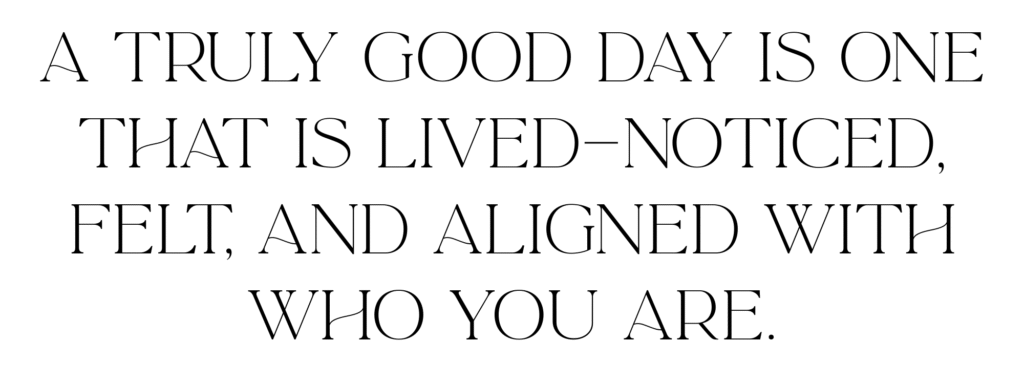What makes a day good?
For many of us, the default answer has been drilled in since childhood: it’s about what we accomplished. A good day is one where the to-do list is shorter at bedtime than it was in the morning, where deadlines were met, where boxes were ticked. Productivity is the yardstick.

And yet, if you’ve ever gone to bed after an extremely “productive” day still feeling unsatisfied, you already know the truth: not every checked-off list equals a good day. Some days we achieve so much and still feel empty. Other days, we barely “accomplish” anything by society’s standards and yet feel deeply content.
So maybe it’s time to redefine what a good day really means.
The Old Measurement: Productivity Above All
Let’s be honest—our culture glorifies being busy. From school grades to workplace performance reviews, we are taught to measure worth by output. “What did you do today?” is often code for “What did you achieve that can be measured?”
This mindset is why so many of us equate a good day with how much we got done. Did we finish the project? Did we cross things off? Did we prove ourselves valuable?
The problem with this measurement is that it ignores the intangibles—the quiet, meaningful parts of life that can’t be captured on a chart or resume. It reduces life to a race of never-ending tasks, where the finish line keeps moving.
Eventually, the measurement stops inspiring us and starts draining us. We’re left exhausted, yet feeling behind.
The Subtler Measurement: Presence
Have you ever had a day where “nothing special” happened, yet you found yourself smiling before bed?
Maybe it was the way the morning light spilled through your window. Maybe it was a real laugh you shared with someone you love. Maybe it was a moment of peace you gave yourself—a walk, a pause, a deep breath where you finally felt present.

That’s presence. And it’s one of the clearest signs of a good day.
Presence means you actually lived the hours instead of racing through them. It’s the difference between eating a meal while scrolling mindlessly and actually tasting the food. Between talking to someone while distracted and truly listening to them. Between rushing to the end of the day and noticing the moments that make it worth living.
When we measure our days by presence, even ordinary ones begin to shine.
The Hidden Measurement: Connection
Another way to define a good day is through connection. Not just with other people, but with yourself.
A day where you feel understood, supported, or simply close to someone you care about is almost always a good day. Human beings are wired for connection—we crave it in laughter, in conversation, even in silent company.

But connection isn’t limited to relationships. It also includes connecting with yourself:
- Did you listen to what your body needed?
- Did you honor your emotions instead of brushing them aside?
- Did you allow yourself a moment of joy, creativity, or rest without guilt?
When you look back, many of your “best days” probably weren’t about grand achievements, but about meaningful moments of connection—where you felt less alone in the world, more aligned with yourself, or deeply at peace with life.
The Lasting Measurement: Alignment
Perhaps the most important measurement of a good day is alignment—living in line with what matters to you.
Alignment doesn’t always look like fireworks. It often looks like small decisions that reflect your values. If health matters, then a walk counts. If family matters, then dinner together counts. If growth matters, then even one page of reading counts.
Alignment answers the question: Did I live today in a way that reflects who I want to be?
When you live in alignment, your days don’t need to be perfect to feel meaningful. Even hard days, even “unproductive” days, can still feel good because they carried integrity, honesty, or love.
Redefining a Good Day
So, what makes a day truly good?

It’s not just about productivity. It’s about balance:
- Presence — Were you here for your own life?
- Connection — Did you feel closer to yourself, to others, or to something bigger?
- Alignment — Did your choices reflect your values?
Of course, achievement still has its place. We all need to get things done. But when it becomes the only measurement, we risk missing out on the richness of life.
A good day isn’t necessarily a perfect day. It doesn’t always mean happiness every minute, no stress, no problems. Sometimes, a good day is simply one where you showed up as yourself, stayed connected to what matters, and allowed yourself to experience life fully.
A Gentle Experiment
Here’s something to try:

At the end of your day, instead of asking, “What did I accomplish?” ask these three questions:
- What moments did I notice today?What moments did I notice today?
- Who or what did I feel connected to?
- Did I live one step closer to my values?
You might be surprised by how often the days that feel “average” on paper turn out to be extraordinary in memory.
Closing Thought
We only get so many days. Measuring them by productivity alone is like judging a book only by the number of pages you read, not by the story it told.

And maybe that’s the new measurement worth carrying forward.





